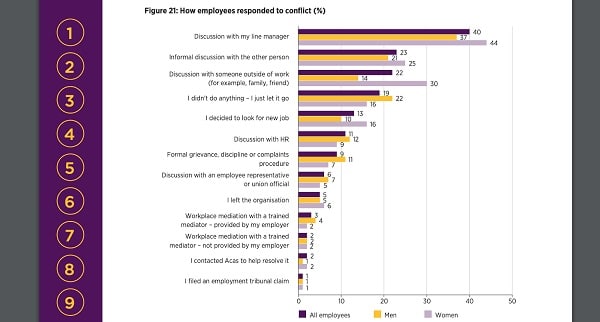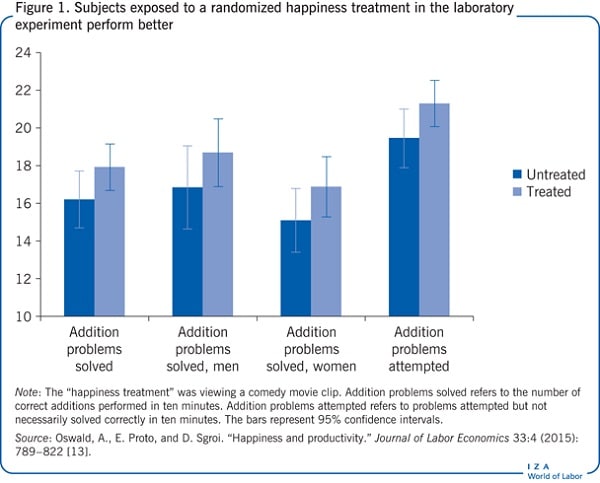Opposites don’t always attract. No doubt we’ve all met someone we struggle to get along with, and sometimes we work with that person. In fact, 49% of workplace conflicts come from personality clashes and egos.
That can cause all sorts of problems in your career. It can interfere with your productivity, your promotions and even your mental health.
So, what do we do?
Well, there are plenty of ways to deal with a personality clash at work as an employee and a manager. We’ll go through them step by step. But, first let’s take a look at why some personalities clash and others don’t.
Why Do Personality Clashes Occur?
We’re all different. We all have different skills, different talents and even different flaws, too. That’s because we all come from different cultural, educational and geographic backgrounds. We all have our own unique way of seeing the world. That also means that we have our unique way of working.
These differences can be great for business. A diverse range of talents can meet a diverse range of customer needs. Just look at the statistics. Over 80% of CEOs said that having a diverse and inclusive workplace has improved their bottom line.
But, these differences can also lead to personality clashes. Sometimes the methods used by one person don’t fit with the person or team they’re working with. Stress and problems at home may also spill into the office.
In other words, since each person is different, personality clashes can be inevitable. We just need to know how to deal with them.
How To Handle Personality Clash At Work
A personality clash at work is always unpleasant, but it can be resolved. If this is the first time you’ve been involved, then this may all sound quite daunting. But don’t worry. Follow these tips and you should be able to resolve the situation in no time.
1. Determine the actual cause of the conflict
It’s difficult to find a solution without knowing the problem first. So, try to find the cause of the conflict.
Causes for conflict in the workplace can often include poor management, unclear job roles and poor communication. Although it’s also possible for conflict to arise from a lack of equal opportunities or bullying and harassment.
Try asking some questions to get to the cause of the conflict. For example, was a task not explained properly? Has good work been going unnoticed? Is someone being denied equal opportunities, or possibly being bullied at work? These are questions you can ask yourself before you raise the issue.
Take some time to write down possible reasons for the conflict and think about how it escalated. Not only will this let you know the cause of the problem, but it will also let you identify it in the future. Then you should be able to avoid similar problems further down the line.
2. Speak with your manager, not your coworkers
After a workplace disagreement, your primary goal should be finding a solution. You’re unlikely to do this by getting other coworkers involved. Other people can take sides and split into groups, causing the problem to become bigger.
That could also lead to bullying and further disagreements. These can interfere with workplace productivity.
It’s always best to tell your manager about any personality clashes as they can act as a neutral person. It will also inform your manager of the situation when it first arises and before it gets any worse.
Your manager may see a solution that’s not evident to you or your colleagues. They have a wider view of the company and your role. So, they could make valid suggestions.
For example, they may feel the personality clash has come from different levels of training in their staff. That could lead them to implement further training for new employees when working on ongoing projects.
3. Communicate to reach a consensus
It’s not always easy to reach a consensus between opposing sides, particularly when both of the parties involved think they are right.
Try not to overreact and take some breathing space to think about what happened. Sometimes the words you need will come later on. Opinions can change after a little thought.
Some people prefer to discuss issues in an open way with a clear goal. Before speaking with the person, ask them if you can discuss things:
- In a neutral setting away from others
- Without any raised voices
- With no interruptions
- With the aim of finding a resolution
Communicate in a way that aims to deescalate the situation. Offer to talk in a neutral way and space. Be as polite as possible and they act the same in return.
You could also try bringing your own solutions to the table. Maybe you could suggest some methods for keeping up work productivity during stressful situations. Maybe your manager will suggest some things too.
That would also show your manager that you want to resolve the situation and possess problem solving skills.
4. Seek out a mediator
Sometimes things don’t always go to plan. Communication can break down and sometimes there’s no solution in sight. At this point it’s best to request some mediation. Or this may be an option offered to you, as some employers use internal mediation by a trained member of staff.

Source: CIPD
That involves discussing things with a mediator, who’s usually a neutral person from HR or management (not necessarily your manager). They will structure conversations in a way that aims to find a solution to the problem.
Take some time to think about your concerns and any possible solutions. That way you’ll be able to express yourself on the day. Go in with the aim of working things out.
5. Concentrate on the positive aspects of your situation
Always look on the bright side of life. Even if you get into a personality clash at work, there are still many other things going on. Try to find the positive and learn from the negatives.
A personality clash may be unpleasant, but it will also let you grow and learn from mistakes. These could be the mistakes of the other person, or your own. After all, we all make mistakes and sometimes the hardest thing can be owning up to them.
Try to empathize with the other person and see things from their perspective. Question if you were in the wrong and what more you could have done to stop the situation from escalating.
Think about the positives that can come from reconciliation. Then, look towards a solution that works for everyone involved.
Your wellness and happiness are important for your mental health and work productivity, people perform better when they’re happy.

Source: Wol
So, a positive outlook could lead to some improvements in your work, too!
6. Implement an open-door policy grievance policy
Managers also have a part to play in workplace disagreements. The right management methods can help prevent personality clashes. They can also encourage employees to raise issues before things get serious. At Voila Norbert, they promote a healthy culture of idea-sharing and feedback.
An open-door policy for grievances lets employees know they can approach managers. It will also help staff feel more relaxed about seeking help from an outside party.
HR departments can also install such policies. That will help solve other issues that may not occur between two employees in the same team. Disputes can happen between teams, departments and even between managers and their staff. So, a company-wide policy may be a good solution for larger companies.
It’s also good for promoting a positive work culture. That will be noticed by both employees and customers alike. You can promote your positive work culture online, using a top SEO agency, for instance, so everyone can see how great it is to work at your company.
Proactive work can go a long way in addressing and solving conflicts at work. So, put the work in at the beginning and you should see results down the line.
7. Stay away from public confrontations
The workplace is not a soap opera and you should not treat it as such. So, try to avoid any kind of public confrontation, such as shouting or fighting in the middle of the office. Such behavior will make you both look bad and could impact your career. It will also make the workplace feel uncomfortable for others.
You have full control of your behavior and what you say. Even if someone else is shouting, you don’t have to join in.
If a situation does seem to be getting out of hand, then try your best to de-escalate it. If necessary, remove yourself from the room. Take some time and space to think about everything.
Managers can also get involved in preventative measures by introducing conflict resolution training. Encourage your team to attend webinars on conflict management in the workplace and ways to communicate effectively. That will give employees the tools to de-escalate conflict.

Data Source: CMOE
Whilst this training may cost money, it could end up saving you more money through avoiding serious conflicts at work.
Wrapping Up
Personality clashes happen all the time. Sometimes you can’t avoid them. But they’re not the end of the world. They don’t have to be the end of your career.
Try to think things through and empathize with any other people involved. Then, try your best to de-escalate the situation. Always aim to solve the problem, not make it worse. If you need help, then speak to a manager or someone from HR. Management, for its part, should implement an open-door grievance policy and allow employees to speak.
There’s always a solution to be found. You just have to find ways. Good luck!
Looking For HR Management System?
Call Pursho @ 0731-6725516
Telegram Group One Must Follow :
For Startups: https://t.me/daily_business_reads







